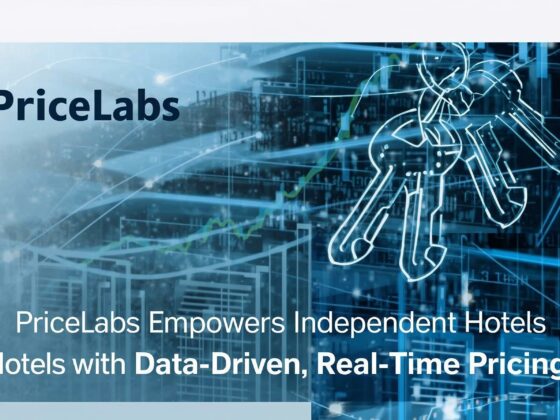Making Change Work: A Conversation with Ryan King on Hotel PMS Implementation and Leadership
This article is the first installment in The Implementation Playbook, a new Shiji Insights series examining the realities of hotel PMS implementations. Across five parts, the series will explore the leadership behaviors, operational structures, and on‑property practices that determine whether a technology rollout succeeds or struggles. This first article focuses on the foundational mistakes hotel groups commonly make, and what leaders can do to avoid them.
Implementing a new Property Management System (PMS) is one of the most transformative steps a hotel group can take. However, while the promise of improved efficiency, better data visibility, and streamlined operations is clear, the road to achieving it is rarely smooth.
Behind every successful rollout lies disciplined planning, strong leadership, and, above all, open communication between corporate offices, property teams, and technology partners.
To explore what makes or breaks a hotel PMS implementation, Shiji Insights spoke with Ryan King, Senior Vice President of the Americas, who has guided dozens of complex projects across global hotel portfolios. In this in-depth conversation, Ryan shares hard-earned lessons about change management, corporate alignment, discipline, and the human side of digital transformation


Takeaways
Lead with the “why.” A clear purpose drives engagement and cooperation.
Secure leadership alignment. Unified messaging prevents confusion.
Treat go-live as mission-critical. Presence, preparation, and discipline define success.
Empower champions. The right people accelerate adoption and morale.
Stay disciplined under pressure. Structure and calm leadership turn problems into progress.
The Human Side of Change
Industry Context: Even with today’s intuitive, cloud-based systems, digital transformation in hospitality remains as much a people challenge as a technical one. Hotels that invest early in change management see higher staff confidence, smoother go-lives, and faster ROI. Industry studies consistently show that technology projects with defined communication plans are 30–40% more likely to succeed.
When a hotel group decides to replace its core operational system, what does a realistic change-management plan look like, and what are the first three things that must be communicated to property teams?
I think the most important thing to realize is that change is hard. As humans, we don’t always adapt to change easily. Corporate offices often make choices to change central systems that don’t necessarily take into account what the end users think. To alleviate the resistance to change, it’s important that the corporate office formulates a communication plan for the hotels. This helps ensure a smoother implementation of the new platform and creates a feedback loop with the end users.
The first and often most important, communication is why we are doing this. What is the purpose of changing the system, and why should an end user at a property care? This message helps set the stage for what is to come.
The second message should acknowledge that change brings opportunities to improve how the business runs, but it will only be successful if everyone embraces that change. Often, resistance comes out in negative user behavior and unwillingness to contribute to project success.
The third, and often most critical to gaining adoption, is sharing the project plan itself, key milestone dates, who does what, what corporate’s involvement will be, and what’s expected of the end-user team. This sets the tone that everyone is part of a single team responsible for making the change successful.
“Technology doesn’t fail people; lack of communication does. When leaders explain the ‘why’ behind a system change and stay visible through the rollout, teams stop resisting and start owning the result.” Ryan King
Alignment at the Top
Industry Context: Even the best-designed plans can falter if senior leadership isn’t visibly united. Ryan says one of the biggest early warning signs of a troubled project is weak or delayed corporate engagement.
Many projects struggle because corporate leadership is loosely aligned, leaving property leaders in the dark. How do you secure visible, ongoing sponsorship from the top and translate that alignment into clear instructions at the hotel level?
It is crucially important for any major platform change to have corporate alignment across the top. Often, technology changes originate from the IT team, but they affect every department, so there must be a unified message across all teams at the corporate office.
We worked with one group trying to roll out a new system, but the IT team didn’t have buy-in from the other departments. The result was constant conflict. The finance and operations teams were at odds with what IT had envisioned, and the revenue team was on a completely different page. That lack of alignment led to confusion, frustration, and a negative perception of the project among hotel staff.
Where I’ve seen much better success is with groups that have a written plan, involve all departments before the first property goes live, and have a clear escalation plan in case of conflict. In one example, the IT team ensured cross-department collaboration and kept the property, partner, and corporate teams aligned to a single vision. When questions or concerns came up, issues were resolved quickly and positively. The head of IT played a crucial role in keeping the C-suite aligned, which made all the difference.


Go-Live Discipline: Treat It as Mission-Critical
This is the moment where everything in a property project has led up to. Overnight, after night audit runs in the old system and the new system goes live, there are many things happening to ensure inventory is balanced, rates and revenue are correct, and all future reservations and availability are switched properly.
This is also when “classroom” training becomes “live” training. The front office team will be checking guests out of a new system, where they may have checked them in on the old system the day before.
The management’s presence and commitment to this event are crucial. What has management done to ensure their departments are ready? What collaboration is expected with the partner, and what support does the corporate office provide? These expectations should be clear long before cut-over.
A well-run project ensures everyone understands the importance of the cut-over date and that date stays firm. I’ve seen organizations push the go-live date three times in ten days. The result was chaos and uncertainty that lasted weeks. I’ve also seen teams treat cut-over as routine, showing up unprepared, which led to enormous stress. The most successful projects are those that are disciplined and transparent, so every stakeholder knows what to expect.
“You have to plan for things to go wrong. Projects lose momentum when discipline disappears. The teams that stick to the plan, communicate clearly, and stay calm under pressure are the ones that succeed.” Ryan King
The Importance of Champions
Industry Context: Appointing enthusiastic, empowered champions at each property dramatically accelerates user adoption. Champions translate corporate vision into day-to-day practice and maintain high morale during times of change.
In multi-property rollouts, who should be the designated project champions, and how do you make their accountability clear?
Property champions can often be the critical juncture between smooth adoption and a resistant change process. It’s essential to appoint individuals who are not only competent in their roles but also enthusiastic about the change and able to promote it positively.
In one situation, the property champion we trained resigned a week later. That caused chaos, as having no champions in certain departments meant that no one knew the system, which bred negativity and resistance that lasted for months.
On the other hand, another group brought property champions from their first go-live to train the next team. That was a genius idea. It helped the new champions understand their importance and gave everyone visible proof of internal support. That group achieved the fastest adoption rate and the fewest complaints during rollout.
So yes, the importance of property champions can’t be overstated.
Balancing Governance and Flexibility
Industry Context: Over-customization creates reporting chaos; over-standardization frustrates operators. The best hotel groups set clear configuration “guardrails” but allow structured local exceptions where they make business sense.
Configuration drift can derail standardization when one property wants to do things differently. How can hotels balance flexibility with corporate consistency?
This is when clear corporate communication really matters. Every hotel needs some flexibility, maybe an odd room type or a unique parking setup, but the corporate office must define where standards exist and how variances are handled.
For example, if a group decides that all front-desk items are tax-exclusive, all properties must follow this policy for consistent reporting. If one property prefers tax-inclusive pricing, corporate should explain the rationale and guide them to adjust prices accordingly (e.g., set the price so that $0.91 + tax = $1.00).
This kind of guidance keeps everyone aligned on corporate goals that may not be visible to property teams, like standardized reporting or performance metrics. Good communication brings those invisible goals into focus.
Cutting Through the Noise
Industry Context: Even well-prepared projects hit rough patches. Ryan says the difference between recovery and chaos is the ability to separate signal from noise.
Projects often stall in a blame loop between technology, users, and process. What’s your method for identifying real issues quickly?
The most important thing the corporate office and vendor can do is stay in lockstep and avoid playing the blame game. When something goes wrong, it’s often easier to blame the technology than to look deeper into the issue.
Usually, it comes down to three things: lack of understanding, a conflicting setup that wasn’t fully thought through, or an actual bug. All three cause frustration, but only one is a real software problem.
When issues arise, it’s up to the client to help filter the noise and calm their teams. A calm, factual record of the problem makes it faster to fix. Once the issue is resolved, both parties should analyze the cause and adjust their processes to prevent recurrence.
The biggest problem I see is when emotions run high and communication breaks down. Negativity can spread, even to other properties. Staying factual, structured, and collaborative is essential.
The Discipline Factor
You often stress the need to “be organized and disciplined.” What concrete habits help teams stay disciplined when politics or frustration emerge?
You must plan for things to go wrong. Even with the best planning, surprises can still occur. When the team stays on track and continues to communicate clearly, it’s easier to navigate through problems. But when a project loses discipline, it becomes chaotic for everyone: the hotel, the partner, and the corporate office.
We once deployed a PMS at a property the client was acquiring. They called us at the last minute to switch systems immediately. We hadn’t had a chance to learn the property or prepare the staff, and the cut-over date kept changing. When we finally went live, some integrations weren’t ready. It was chaos, and although we stabilized within 60 days, the damage to trust had been done.
When a project goes sideways, the best way back is to return to the plan. Stick to the agreed processes, communicate openly, and keep everyone focused. Discipline and transparency make recovery possible.
Accountability and Partnership
What should technology partners do when a client isn’t maintaining discipline or accountability during implementation?
In hospitality, we naturally want to go above and beyond for our customers. It’s part of our DNA. But there are times when a partner needs to push back.
In one case, a property team wasn’t engaged or taking responsibility, and we moved forward anyway. It was rough, lots of friction, stress, and resistance to adoption. Looking back, we should have pushed back.
It’s a fine line. Partnership means having your customer’s back, but also being honest about what’s required for success. When things aren’t going as planned, there should be a clear escalation path to help get the hotel back on track. There needs to be shared responsibility; otherwise, the rollout suffers.
Integrations: The Critical Connection
Industry Context: Integrations make or break a PMS rollout. Leading hotel groups now lock key integrations 60 days before go-live, avoiding last-minute chaos and costly downtime.
Integrations often derail timelines if assumptions change late. What do you insist on before approving cutover?
Integrations are the most critical part of deployment. If an integration isn’t ready, the whole project is at risk.
We once worked with a customer who changed a key integration just a few weeks before go-live. After launch, it caused major issues with financial reporting and operations. Teams that weren’t part of the project started blaming the system. In reality, the client had no plan for handling the change manually, so we had to create one on the fly.
Since then, I have always insisted that integrations are finalized at least 60 days before go-live. That gives every team, hotel, corporate, and vendor time to align. If something must change at the last minute, you need a solid manual workaround. No loss of functionality can be acceptable.
Training Across Generations
Industry Context: Hospitality teams encompass a diverse range of generations and learning styles. Blending hands-on coaching with quick digital refreshers helps bridge the gap and keeps everyone engaged.
Resistance to change isn’t uniform; newer staff adapt quickly, while long-tenured staff often resist. What training strategies work best?
We tailor training by department and role, but we do see differences in adoption. Younger staff members usually adapt quickly; they tend to like mobile devices and new tools. More tenured staff often want to do things exactly as before.
At one property, younger team members embraced tablet check-ins. Others refused to leave the desk or wanted guests to sign paper forms. The finance team wanted digital signatures, but the old habits persisted.
We found that having a more tenured staff member champion the change helped. When long-time employees saw one of their own supporting the project, resistance softened. It’s about finding the right voices to lead within each property.
Learning from Failure
Not every pilot goes smoothly. How do you decide whether to pause, replan, or push forward?
It’s always the rough projects you learn the most from. I’ve found that failures are rarely about the technology; they’re about people, process, and discipline.
In one case, our first two projects with a group were tough: shifting timelines, turnover, and unclear accountability. We realized we needed to pause. We brought everyone, vendor and client, into a room, looked at the data objectively, and the client recognized they weren’t ready. They created a new communication plan, clarified roles, and the next rollout went smoothly.
Things don’t go well by accident, and they don’t fix themselves. You have to stop, learn, and realign before continuing. After that, every project improved dramatically.
Final Words
Hotel PMS implementation is never just a technical exercise; it’s a leadership challenge. Success depends on effective communication, alignment, discipline, and the ability to remain calm in challenging situations.
As Ryan King puts it:
“Smooth projects don’t happen by accident. They happen when teams understand the ‘why,’ stay disciplined, and treat each other like partners in success.”









